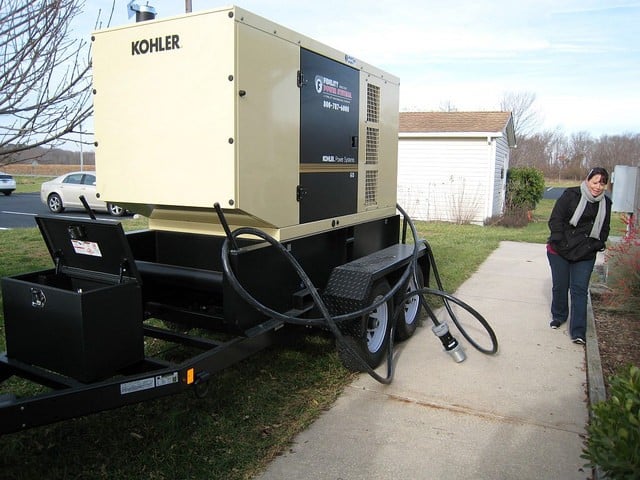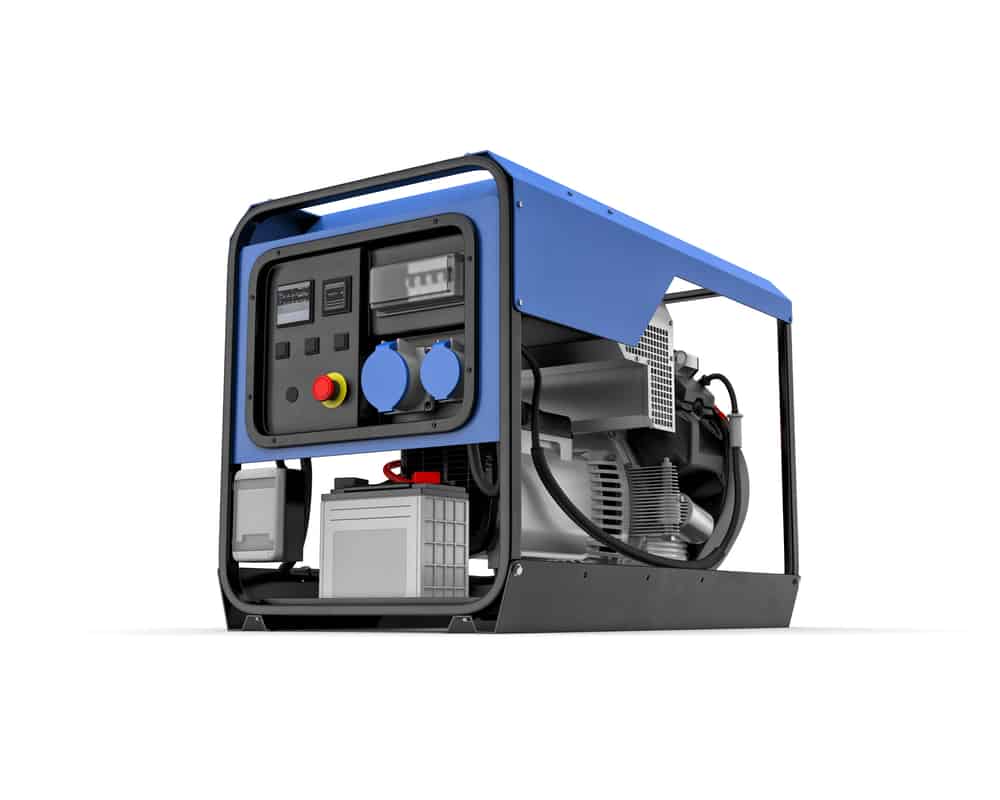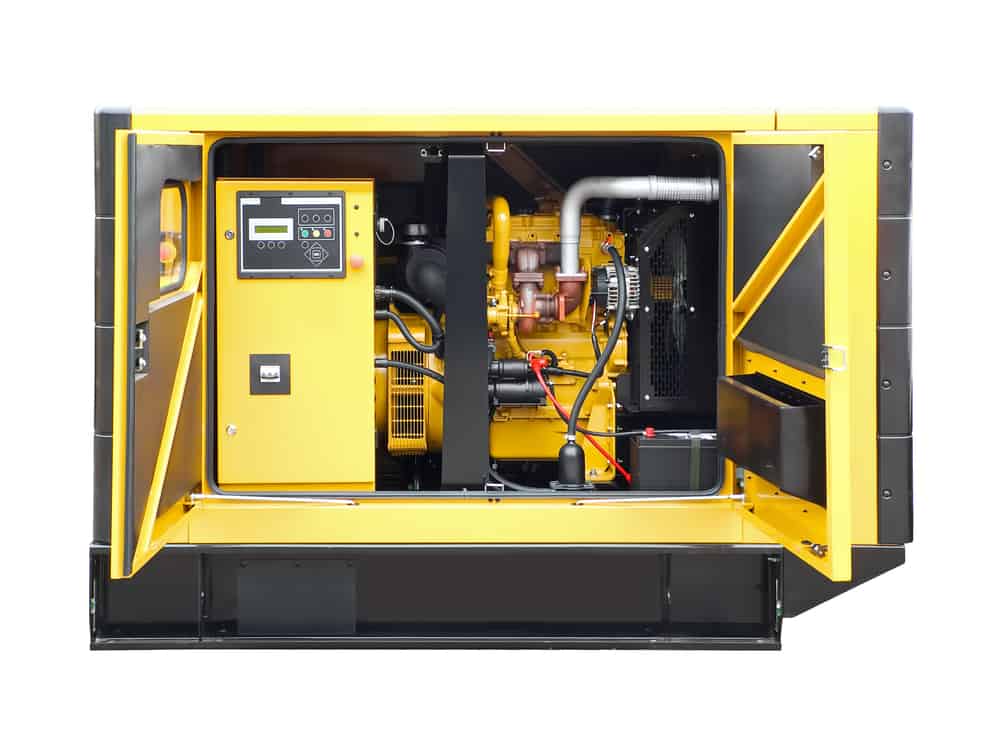At one time, a natural gas generator for the home was considered a luxury. Now with climate change causing extreme heat and severe weather patterns, long power outages are much more common.
A natural gas generator is a device that converts natural gas into electric power. The fuel is compressed and ignited in a chamber to produce heat, which boils water to create steam that drives turbines.
Natural gas generators are used for producing electricity in areas where the grid doesn’t exist or the power lines are not functioning properly. They can also be used as stand-alone devices for providing power at remote locations where it’s not economical to build a grid.
They are generally used in gas power plants and other industrial applications where reliability and availability of power are a concern. Gas generators are often used when the utility grid is not available or to provide backup power for critical loads.
Natural gas generators are overwhelmingly preferred over propane, diesel, and gasoline generators for both residential and commercial emergency power. According to the US Energy Information Administration (EIA), natural gas-fired generators accounted for 42% of the standby power generating capacity in the United States.
To be prepared for natural or man-made disasters, a whole house natural gas or portable natural gas generator is extremely useful. It is an excellent option for homeowners who don’t want to store diesel fuel in tanks that can and will eventually go bad.
Also, when a natural disaster happens, propane tanks and diesel or gasoline can become very scarce and hard to find, making natural gas a better fuel source for emergency power.
Understanding Natural Gas Generators
When you choose natural gas as your fuel source, your generator is connected directly to your property’s utility gas lines. These are located below ground. These natural gas generators are ready to fire up during power outages caused by tornadoes, hurricanes, freezing rain, and fallen tree branches or planned power outages.
Rural areas are even more prone to disruptions in utility power. Reasons for this include small animals climbing power poles or birds perched on power lines, vandalism, and more commonly, lightning strikes.
Today, a home or business owner has the luxury of purchasing a fixed-in-place generator, such as a Generac natural gas generator, at a very reasonable price from big box retailers like Harbor Freight, Home Depot, and Lowe’s.
These retailers and even smaller hardware stores like Menard’s, Ace Hardware, and True Value will also carry portable natural gas generator options that are much smaller. They are adequate to power several appliances, along with some portable light and heat sources.

How does a natural gas generator work?
Both the commercial or whole house gas generator and the portable or natural gas generator for a home will operate on the same principles. Natural gas is piped into the unit through a natural gas line or loaded into the unit from a tank.
The equipment then uses a process similar to that of an automotive internal combustion engine where a mix of fuel and air is injected into a combustion chamber.
It only takes the ignition of a spark plug to ignite the fuel that drives the pistons to turn a crankshaft. As the crankshaft turns, a rotor inside the generator is made to spin within an electromagnetic field producing electrical current to power appliances, tools, and other electrical products.
Choosing a natural gas generator for home
According to the US Energy Information Administration, on average, property owners experienced at least 2 power outages in 2018 that lasted at least 6 hours. Of course, when major events were the cause of power outages, customers experienced longer outages and increased interruptions.
Once you’ve decided that natural gas is the right choice for your home’s emergency power needs when compared to gasoline, diesel, or propane as fuel sources, there are other considerations for choosing the right size and model of natural gas generator for the home.

Types of Natural Gas Generators
Whole House Natural Gas Generator – These automatic power-up systems can keep your home’s appliances and other major systems like heat and electricity running when you are knocked off the power grid. Some standby Generac generator models are permanently installed to provide blackout protection 24 hours per day for weeks.
You can speak to your utility company about the advantages and disadvantages of installing a natural gas home generator where you live.
Permanently installed, stationary generators are better suited for providing backup power to the home than portable generators. This is because generators that are portable present a greater risk of becoming overheated or overloaded. This can cause the generator to fail.
According to Consumer Reports, a whole house Generac natural gas generator that is professionally installed can range from $7,000 to $15,000.
A whole house generator will automatically turn on in the event of a power outage. It typically turns on so that you may not realize there was a disruption if you have an auto generator transfer switch installed. There will be zero concerns about the food in your freezer and refrigerator and other appliances and electronics.
Portable Natural Gas Generator – You can easily find manual portable, stand-by Generac generators at your local home improvement or hardware stores. For example, a Generac GP Series 8000 W 240 V Gasoline Portable Generator costs a little over $1000 at Ace Hardware Store online. Learn more about a natural gas Generac portable generator.
A natural gas portable generator is, of course, smaller and will have less power output. However, because they are portable, you can use these smaller power units in other ways:
- As an emergency home power source to cook food and power space heaters
- To power electrical work tools in the field or whenever a power outlet is out of reach
- To power a mini-fridge, cooktop, lights, and space heater for family camping or weekend hiking trips
Dual-Fuel Generator – These generators can run on natural gas in addition to propane, diesel, or gasoline. These types of generators are becoming more common to accommodate situations where a natural gas hookup would be difficult.
Pros and Cons of Natural Gas Generators
Pros of owning a natural gas generator over other types of generators:
- Natural gas generators burn more quietly and cleaner than other units.
- Natural gas fuel is usually cheaper than propane and diesel fuel.
- Unlike diesel and gasoline fuel, natural gas is odorless.
- Natural gas generators are connected directly to your home’s gas line. This means you won’t worry about running out like you would with a gasoline generator or one fueled by propane or diesel fuel.
- The lifespan of a natural gas generator can be up to 25 to 30 years.
Cons of owning a natural gas generator vs other generator types:
- Natural gas comes with the risk of explosions and fumes escaping.
- A natural gas generator will typically have higher maintenance costs.
- The natural gas supply line can be disrupted due to calamities.
- Propane burns slower and delivers more BTUs (heat per gallon or per cubic foot)
FAQs
How long can natural gas generators run?
As with any rechargeable power source, the amount of time it will run depends on the amount of load and how much fuel is available. Typically, most portable generators are designed to run for shorter periods, often up to 18 hours continuously.
Larger, automatic power-up generators will, of course, run as long as the natural gas source is connected. But, be mindful of the manufacturer’s suggested continuous run period, which may be up to 3 weeks or 500 hours at a time.

How much does a natural gas generator cost?
When choosing a natural gas generator for your home, examine why and how you will want to use the equipment. Consider if it is primarily for weather emergencies and other power outages or if it is to use for extra power around your property.
If it’s for short power outage periods, and only to run a few appliances, consider a portable Generac GP 6500 Watt gasoline generator. You can find it from Home Depot costing about $900 as a very popular choice.
If you’re looking to maintain full home functionality during long power outages, then you will need to determine the electrical load. Consider if your home uses a wide range of electrical appliances. Some examples are a heat pump, electric stove, electric clothes dryer, electric water heater, etc. If so, then you will need a more detailed calculation.
Homeowners can easily get away with paying as little as $4200 at Home Depot for a Generac 16,000 watt natural gas home backup generator that is permanently installed. These types of generators feature dual 120/240V operation and can link to your phone’s cellular service. This means you can monitor the generator’s status from a computer or smartphone.
Don’t forget to consider the installation costs if required for standby generators. This will vary by the system size you select. You will also need to account for any special land/home considerations, and your local building codes.
What size generator do I need?
Can a natural gas generator increase your home’s value?
Potential home buyers are very keen to notice when a home has supporting infrastructure such as whole-house power generators, whole-house water filtering, and whole-house air purifiers.
Even though rural power is fairly reliable in most areas, many homeowners recognize that the consequences of not having power in outlying areas can be particularly severe, especially in emergencies.
A home with a fixed power generator can expect at least a 3 – 5 percent increase in the resale value of the home. This is typically more than enough to recoup the cost of purchasing a home generator.
More importantly, if you work from home, as many people are opting to do, having a power outage even for a few hours can cost a lot of money and unnecessary stress.
Can you power electronic devices with a generator?
This question comes up quite often when homeowners are considering which type of natural gas portable generator to purchase. Sensitive electronics, like flat-screen TVs and computers, can react badly to the uneven power generation (such as voltage surges) of a portable power generator.
However, you can purchase a high-quality surge arrester outlet strip or Uninterruptible Power Supply (UPS) to power these devices.
With a Generac stand-alone natural gas generator, expect it to include an automatic transfer switch. It will seamlessly take over the circuits that are wired to your home’s electrical panels.
The good part is that these larger generators are electronics-safe. This is because they produce a constant, steady voltage of electricity without harmonic distortion.
What is a natural gas generator?
Generators that are fueled by natural gas differ from traditional internal combustion engines by using compressed natural gas (CNG) instead of gasoline or diesel fuel, and by having a gaseous air intake system.
A natural gas generator can be a stationary engine running on natural gas, or a portable device. There are two types of natural gas generators: those with an open combustion process and those with a closed combustion process.
In the open-combustion system, the burning process is not enclosed and the fuel will consume additional oxygen from the atmosphere. In most cases, this will produce high levels of pollutants such as nitrogen oxide (NO), carbon monoxide (CO), and particulate matter (PM).
Closed-combustion engines have an enclosed combustion chamber that provides additional oxygen for burning fuel without atmospheric air mixing into the engine.

Natural Gas Portable Generator Safety Tips
As with all gensets and appliances, take care to read the instruction manual. Also, remember these tips for safety:
Natural gas generators should be stationed at least 15 feet away from any windows or other home openings and water sources. This will help prevent carbon monoxide poisoning, fire, or electrical shock.
Keep the generator in a dry area and on a dry surface. This is important, even if you have to construct a make-shift canopy to prevent the portable unit from getting wet.
Follow any manufacturer’s guidelines for grounding a natural gas portable generator. Use heavy-duty, outdoor-rated extension cords that are in good working condition.
Maintain a proper level of fuel in the unit. Also factor in considerations for how much fuel you can safely store onsite.
Before refueling a natural gas or another type of generator, allow the unit to cool down first. Be sure to only use the type of fuel suggested by the manufacturer.
Whichever generator you choose, whether it is a natural gas generator or another fuel type, you must be sure the generator produces more power than will be used by the appliances and electrical devices you will be connecting to the generator. Factor in the initial surge when turning it on as well. You will also need to be sure all the devices are set to OFF before connecting them to the generator.
Perform a regular inspection of your portable natural gas generator, looking for any damaged, cracked, or corroded components.
Natural Gas Generator for Home
When you consider the risk of weather emergencies, utility company cyberattacks, and power blackouts on our nation’s aging electrical infrastructure, backup power, especially in rural areas, is quickly becoming a necessity.
There are many reasons to get a home generator. A natural gas generator is an economical and reliable choice.
Many people favor them. A big reason is that you do not have to have fuel on hand like you would with a propane, diesel, or gasoline generator. In addition, you will not have to worry about running out of fuel. How Much Gas Does a Generator Use?

